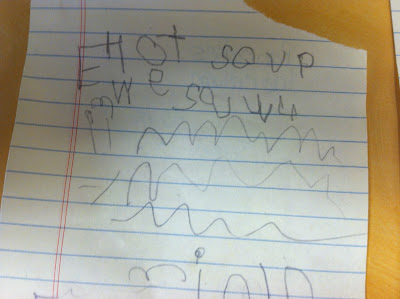A few years ago I posted about a school that took out all the play kitchens because those things didn't support literacy. Something that happened recently in my church kindergarten class reminded me of that post and of the fallacy behind that thinking.
In our play kitchen, I put aprons and placemats and menus. I added a few signs on the walls about good food to eat (and I added a Diner sign). I placed a couple of notepads and pencils. My thoughts? Kids could play out restaurant if they chose. (Of course, they can push aside my ideas and do something else completely.)
Two girls were playing in the center, taking phone orders and cooking and hoping for customers. Then I noticed one girl standing near the wall; the other girl joined her to see what was happening.
I saw the girl writing on the notepad and talking to the other girl. I thought it was just part of the ongoing play in the center.
Later the girl brought me her pad and asked, "What does this say?"
I read the words to her. She had been carefully copying the letters and words she saw on one of the signs. (The other letters are part of another sign, too.)
No one said to write words or even notice them. No one pushed for writing letters or writing at all. The opportunity to write was there (notepads and pencils). Words were around (the signs). She chose to explore writing them.
And you'll note on that page that there are squiggly lines, too. Those are orders that she took down. I know, not readable text. But she is making the connection between writing, meaning, and real life. That's an important literacy concept, too.
Because of the nature of our church class, I don't do heavy duty literacy instruction. But books and pencils and paper and words are always around. We write our names often on artwork or other materials we are using. We draw and print and explore different writing materials. Pads or clipboards of paper or dry erase boards are added to centers.
Literacy opportunities are all around. Allowing kids to explore and choose can be a valuable way to reinforce other instruction. I worry about those classrooms (and the kids in them) that take out kitchens or blocks or open-ended exploration materials. They are missing important ways to teach all kinds of concepts, literacy and otherwise. (And not just for little kids. Bigger kids, too.)


